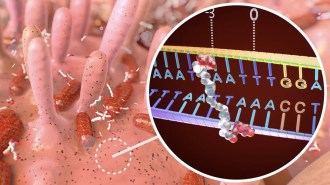Asperger’s syndrome may not lead to lack of empathy
People with autism can feel others’ pain, two new studies show.
- More than 2 years ago
Autism robs people of social and language skills and locks people in their own worlds. Scientists thought that the social defects were due in part to an autistic person’s inability to determine what other people think and feel and adjust behavior accordingly. But new research from scientists in Switzerland and the Netherlands shows that the brains of people with Asperger’s syndrome or other high-functioning autism spectrum disorders do respond with empathy to others’ pain or emotion.
Tania Singer of the University of Zurich in Switzerland and her colleagues studied people who have trouble identifying their own emotions, a condition known as alexithymia. “You need to understand your own feelings to understand the feeling of other people,” Singer says.
The disorder isn’t well known and often doesn’t interfere with people’s lives, Singer said April 14 in San Francisco at a meeting of the Cognitive Neuroscience Society. About 10 percent of people in the general population may have alexithymia. But people with Asperger’s syndrome are far more likely to have alexithymia, with 60 to 80 percent of this group having the condition.
The researchers first tested couples to find out how empathy works in the brain normally. One partner was in a brain scanner known as an functional MRI, which uses magnetic fields to measure blood flow in the brain, an indicator of brain activity. Researchers made the person feel pain in a hand. A part of the brain called the insula, involved in linking body responses and emotion, lit up in response to the pain. When the partner of the person in the scanner experienced pain, the insula of the partner in the scanner lit up in sympathy.
But
in people who have alexithymia, their insulas didn’t activate when they saw their
partners in pain. The insulas of people with Asperger’s syndrome also lit up
when they saw others in pain, but only when they were in touch with their own
emotions.
The result may mean that researchers and clinicians should rethink the deficit in empathy associated with Asperger’s syndrome. “I would just claim not all Asperger’s [patients] will have an empathy deficit,” Singer says. It’s the degree to which people have alexithymia that determines whether they have an empathy deficit.
Another study seems to back up Singer’s claim. Researchers at the University Medical Center Groningen in the Netherlands showed short videos of people tasting a drink to healthy controls and high-functioning people with autism spectrum disorders. The video showed a person making a disgusted face after tasting the drink, showing no reaction or showing pleasure. When healthy people viewed the videos, the parts of their brain that control emotion and face movement responded just as they would if they had tasted a disgusting or pleasant drink. The brains didn’t respond much to the neutral face, as expected. On average, people responded more to the disgusted face than to the pleased face. That is not unusual. Many studies have shown more of a reaction to negative emotions and images than to positive ones.
Previous studies showed that when viewing pictures of people making emotional faces, children with autism fail to turn on “mirror” neurons responsible for helping people mimic others’ actions and to empathize.
The researchers expected that the brains of people with autism would not respond to the videos as much as those of healthy people did, says Jojanneke Bastiaansen, one of the Dutch researchers, who presented the results April 15 at neuroscience society meeting.
“It was a nice hypothesis,” she says.
But people with autism actually showed more activity in emotion-control areas and in the parts of the brain associated with controlling facial motion. The result indicates that the mirror neuron system is not broken, Bastiaansen says.
Still, the reaction is far from normal, says Marina Pavlova of the University of Tübingen in Germany. The overactivation could be a sign that people with autism have to expend more effort to empathize or could be an indicator of overstimulation, she says.
“You can have so much empathy that it’s painful for you, so you have to disengage,” Pavlova says. “Sometimes autistic people are not insensitive; they’re too sensitive.”







